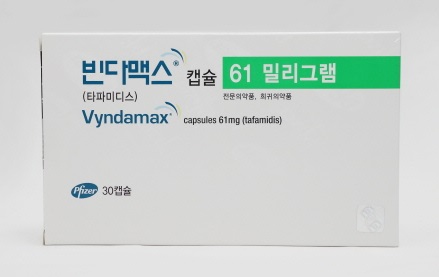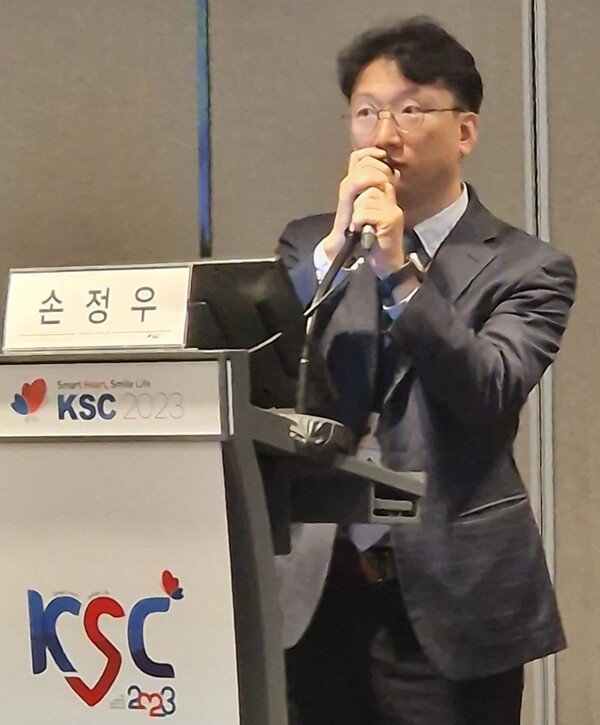For Vyndamax (tafamidis), a treatment for the rare disease transthyretin amyloid cardiomyopathy (ATTR-CM), to win insurance benefits, its maker, Pfizer Korea, must be more willing to share the risk, experts said last week.
They shared this and other views at the insurance session of the 67th autumnal academic meeting of the Korean Society of Cardiology on Saturday, which shed light on the reasons for Vyndamax's failure to get reimbursement and ways to improve the situation.

Vyndamax is a rare disease treatment approved by the Ministry of Food and Drug Safety (MDFS) in August 2020 to treat adult patients with wild-type or inherited ATTR-CM.
Pfizer's first reimbursement attempt for Vindamax failed to secure an essential drug designation. Pfizer launched a second coverage challenge through a Risk Sharing Agreement (RSA) in the first half of 2021 but failed again.
However, Pfizer was undeterred, launching a third reimbursement challenge for Vyndamax. The drug, which had not made it past the Subcommittee on Reimbursement Standards, seemed to make progress last September when the reimbursement standard was set but failed to convince the government in the subsequent Economic Evaluation Subcommittee and Risk Sharing Subcommittee and finally received a “non-reimbursement”' decision at the Pharmaceutical Reimbursement Evaluation Committee this past April.
According to the evaluation results, three main factors led to the non-reimbursement decision of Vyndamax.
First, the degree of clinical improvement of Vyndamax depends on the type and stage of the disease, and there are no studies with a sufficient number of patients and observation periods to analyze this. Second, considering this uncertainty, the risk-sharing subcommittee proposed a complete reimbursement system for the initial treatment, a simple reimbursement system for later treatment, and a total limit system. However, the pharmaceutical company did not accept them. Third, the economic evaluation showed that Vyndamax was not cost-effective.
However, Korean cardiologists said that there is room for reconsideration for two of the three reasons.

"Due to the nature of rare diseases, it is difficult to conduct clinical studies to evaluate the degree of clinical improvement in all types and stages," said Professor Sohn Jeong-woo of the Department of Cardiology at Wonju Severance Christian Hospital, who spoke on the topic of reimbursing a new drug as seen in the Vyndamax’s failure. “We continue to see the release of detailed types and levels of Real World Data (RWD) from countries that approved it, and we should consider how to complement it from these examples.”
Economic evaluation is all about the value of a drug compared to existing treatments, and in the case of Vyndamax, it is challenging because there is no existing drug to compare it to, Professor Sohn said. Also, in the case of rare diseases, it is almost impossible to prove economic feasibility, so other alternatives are needed, he added.
The committee cited "non-recommendation" results from England, Scotland, Canada, and Australia as a reference for cost-effectiveness.
Sohn refuted it, saying, "In contrast, Vyndamax is covered by insurance in 36 countries worldwide, seven of which, including China, have lower national income levels than ours.”
However, he refrained from commenting on the failure of pharmaceutical companies to accept the government's risk-sharing proposal.
Still, most experts at the conference agreed that the pharmaceutical company should be more active in risk sharing." Some even argued that the developer “should cut drug prices."
The high price of Vyndamax has been criticized not only in Korea but also in other developed countries.
For example, an expert consensus statement on cardiac amyloidosis published this year by the American College of Cardiology (ACC) called Vyndamax "the only FDA-approved drug available for all ATTR-CM." Still, it noted that "its high cost necessitates a copay assistance program for patients."
This is why there have been growing calls for reducing the price of Vyndamax in Korea.
Professor Sohn also expressed his opinion on improving the treatment environment for ATTR-CM patients regardless of whether Vyndamax is paid or not.
"Even if Vindamax is covered by insurance in the future under the current benefit standards, it is meaningless if it does not become an assessment exception," he said. "There are quite a few patients diagnosed with ATTR-CM but are not eligible for calculation exception because the diagnostic criteria for ATTR-CM are different from the existing diagnostic criteria for amyloidosis (which is subject to calculation exception)."
In this regard, the Korea Disease Control and Prevention Agency (KDCA) is reviewing the designation of ATTR-CM as a rare disease and will likely reach a decision within the year, Sohn added.

